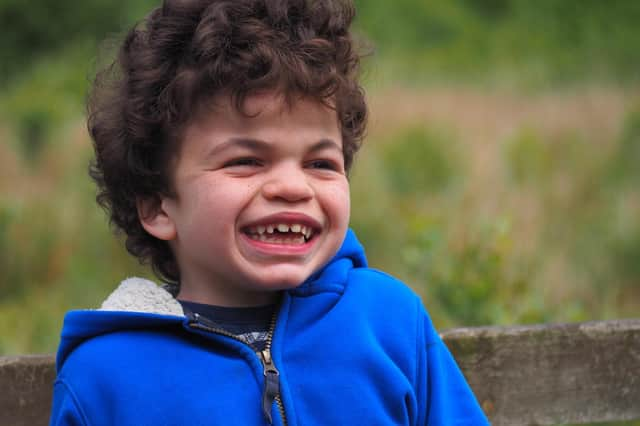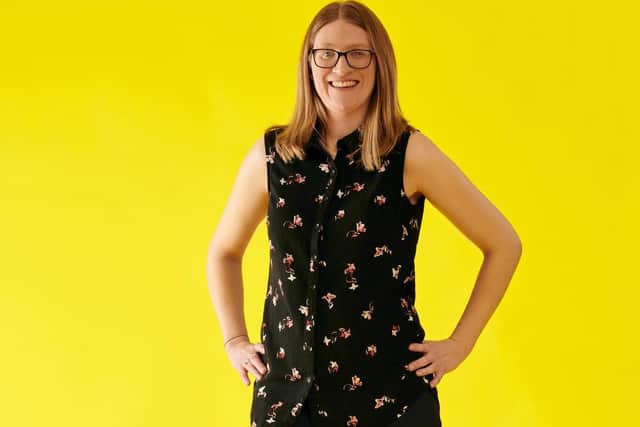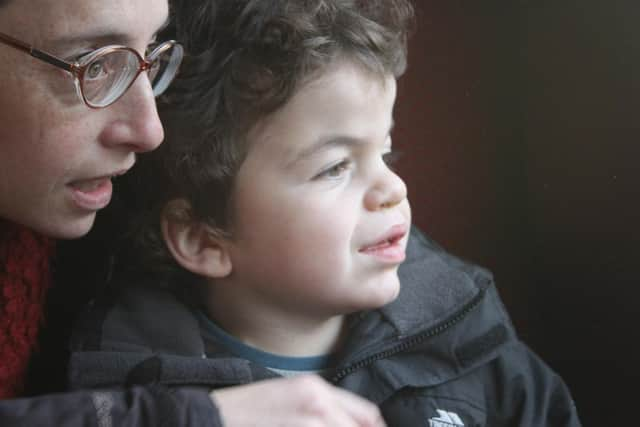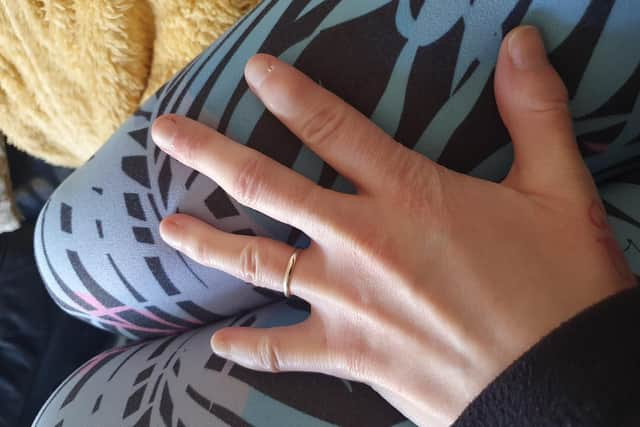'Any new hope is worth fighting for' - These Yorkshire families are raising awareness of rare disease and how it affects them


Nicola Fielding is one in 17. She’s among the 3.5 million people in the UK who will be affected by rare disease at some point in their lives. The majority of the conditions have no effective treatment and on average it takes more than four years for people to receive an accurate diagnosis. Niki, as she’s known, is part of a campaign that is working to change that.
Since its launch in January 2020, I Am Number 17, which takes its name from the statistic of those affected by rare disease, has been helping to raise awareness of the many challenges that the community faces.
Advertisement
Hide AdAdvertisement
Hide AdIts latest phase is focused on encouraging healthcare professionals to keep rare disease “front of mind” with the aim of helping more people to receive the correct diagnosis more quickly.
Niki has Feingold Syndrome, a disorder that can have varying characteristics including abnormalities of the fingers and toes, microcephaly - a small head size, short stature, hearing loss and gastrointestinal atresia - a blockage in part of the digestive system.
“Working with healthcare professionals, we are opening more doors for all of us,” says the 36-year-old, of Barnsley. “I want to raise awareness, get my face out there - and get my fingers out there. It’s about getting emotional support and also about getting more understanding from the medical side, because we are so rare.”
Niki wasn’t diagnosed with Feingold Syndrome until 2015, though her mother had noticed problems with her hearing when she was young. She has hearing loss in both ears and is prone to ear infections.
Advertisement
Hide AdAdvertisement
Hide Ad“They have hospitalised me and can really knock me down,” she says. “I can be in that much pain that it will completely knock me out. I can be sat in a corner rocking and crying because of the pain.”


Her Feingold Syndrome is also characterised by webbed toes and the shortening of her fifth finger, which curves inwards. She says she was often bullied at school because of the differences.
"I struggled as a teenager relating to friends,” she says. “Once you have the label of ‘freak’, it sticks and I became more withdrawn. Consequently, upon leaving school my mental health took a nosedive and I found it difficult to build and maintain relationships, both with friends and work colleagues.”
In 2014, Niki found out she was expecting twins. Sadly, after abnormalities were detected on one of her scans, one of the pregnancies was terminated as the baby wasn’t growing properly. The other was born at 23 weeks with a duodenal atresia - a blockage in the small intestines that stops food and fluid from passing through. He died after 58 days.


Advertisement
Hide AdAdvertisement
Hide AdWhen her rainbow baby, now her eldest of two children, was born in 2015, he too had a duodenal atresia and had to have an operation on his digestive system. It was only then that Feingold Syndrome was mentioned to Niki by medical professionals. Genetic testing confirmed she had type 2 of the condition - without gastrointestinal atresia - and her son had type one.
“What’s so frustrating with Feingold Syndrome is that there’s nothing out there,” she says. “At the time of my diagnosis, I was one in 20 [people] in the world. We’re still finding things out - could this be part of the Feingold, could that be? It’s really difficult.”
Every year, February marks rare disease month, when communities, organisations and researchers come together to raise awareness of rare diseases and the need for further investment in medical research. It culminates with Rare Disease Day at the end of the month, this year on February 28.
Sally Mitcham is among those sharing how their lives and families are affected by rare disease. Her nine-year-old son Danny has Hunter Syndrome, a rare disease that almost exclusively affects boys. It is caused by a faulty gene that leads to the lack of an enzyme that is vital for breaking down sugars in the body.


Advertisement
Hide AdAdvertisement
Hide AdWithout this enzyme, waste sugar molecules build up and cause permanent, progressive damage to the body and brain. People with the syndrome will typically have distinctive features such as thickened bones and short stature. There’s no cure and limited treatment options.
Sally says she had concerns early on that Danny wasn’t developing as expected. Shortly before he turned three, they were referred to a paediatrician and in July 2015, he was diagnosed with mucopolysaccharidosis type II, also known as Hunter Syndrome.
“Just like that, everything is ripped away. All hopes and dreams for your child are gone,” says Sally, of York. “Having to tell Danny’s dad that the worst-case scenario is we lose our son at 10-years-old was the worst thing I’ve ever had to do.”
Danny has the most severe form of the disease and his family are painfully aware that their time with him will be cut short. “It felt so unreal,” Sally reflects of the diagnosis. “I could wake up in the morning and think ah it’s a lovely day and then the knowledge would punch into me that it can’t be a lovely day because Danny’s going to die…It didn’t feel right that normal life was carrying on around me.”
Advertisement
Hide AdAdvertisement
Hide AdDanny lives in the moment, enjoying watching TV and having cuddles with his family. He now needs help with walking and eating and will gradually rely more on his wheelchair. “He was always a really engaging little boy who would treat everyone as a friend. He had a massive smile, he was into everything, would never sit still. But all of that’s gone,” Sally says. “It’s the emotional side that’s the hardest, adjusting to each new progression in his condition and the knowledge that we’re losing him bit by bit.”
After being diagnosed, Danny received enzyme replacement therapy. But that treatment stopped when his body began to reject it last May - and whilst it was effective at reducing the impact of the disease on his bones, joints and other parts of his body, the treatment is not able to slow disease progression in the brain.
Charities Action Medical Research and LifeArc are jointly supporting a team at the University of Manchester who are investigating a new way to get treatment into the brain, which could one day transform the outlook for boys like Danny.
Sadly, Sally knows that the stem cell gene therapy combination will come too late for them. “We will lose our beautiful boy to Hunter Syndrome,” she says. “But any new hope is worth fighting for.”
Advertisement
Hide AdAdvertisement
Hide AdWhilst rare conditions are individually uncommon, collectively there are over 7,000 of them. Three quarters affect children and thirty percent of children with a rare condition die before they turn five.
“The issue with rare diseases is that they don’t get much attention,” Sally says. “If people don’t know about them, you can’t raise the funds for research. I’ve always wanted to tell people about Danny, about Hunter Syndrome, about rare disease so charities like Action Medical Research can put money towards really important research work. Each new development brings hope for families in the future.”
The I Am Number 17 campaign, created in January 2020 by biopharmaceutical company Takeda UK together with patient advocacy groups from across the country, launched its latest phase last month, ahead for the forthcoming rare disease day on February 28.
In collaboration with charity Medics 4 Rare Diseases, it is inviting healthcare professionals to take part in a free online programme designed to raise awareness of rare diseases so that they can “help to find the 1 in 17”. Four healthcare professionals are also supporting the campaign by sharing their own experiences of rare disease.
Visit www.iamnumber17.org.uk
Advertisement
Hide AdAdvertisement
Hide AdFor more on Rare Disease Day and Danny’s story, visit action.org.uk/rare
Support The Yorkshire Post and become a subscriber today. Your subscription will help us to continue to bring quality news to the people of Yorkshire. In return, you'll see fewer ads on site, get free access to our app and receive exclusive members-only offers. Click here to subscribe.
